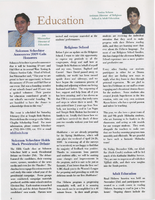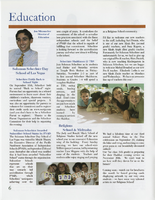Search the Special Collections and Archives Portal
Search Results
Kirsten Searer (Nevada Public Education Foundation) oral history interview conducted by Magdalena Martinez and Taylor Cummings: transcript
Date
Archival Collection
Description
From the Lincy Institute "Perspectives from the COVID-19 Pandemic" Oral History Project (MS-01178) -- Education sector interviews file.
Text
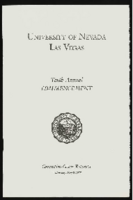
University of Nevada, Las Vegas (UNLV) 10th commencement program
Date
Archival Collection
Description
Commencement program from University of Nevada, Las Vegas Commencement Programs and Graduation Lists (UA-00115).
Text

Transcript of interview with Juanita Kilburg by Vincente C. Camacho, March 7, 1981
Date
Archival Collection
Description
On March 7, 1981, Vicente C. Camacho interviewed accounting clerk, Juanita Kilburg (born September 25th, 1923 in Los Angeles, California) on the second floor of the UNLV Dickinson Library. Kilburg explains how her family first moved to Southern Nevada and her father’s ties to the railroad. She then goes on to explain the growth of the military and Nellis Air Force Base. The interview concludes with a discussion on her work with the American Legion service organization.
Text

Transcript of interview of Thalia Dondero by Mary Germain, March 13, 1976
Date
Archival Collection
Description
On March 13, 1976, Mary Germain interviewed Thalia Dondero (born 1921 in Greeley, Colorado) about her life in Nevada and her experiences as the first female commissioner for the Clark County Commission. Dondero first talks about her upbringing and her eventual move to Southern Nevada. She also discusses her involvement in extracurricular activities, such as being a leader for the Girl Scouts, and how some of those experiences led her to get involved in politics. Dondero also mentions her work with National Geographic and her passion for working with oil paintings and watercolors. The final part of the interview involves some of Dondero’s accounts as a commissioner for Clark County and some of the challenges she has faced in that position.
Text

Transcript of interview with Linda Hartley by Pauline Marchese, March 10, 1978
Date
Archival Collection
Description
On March 10, 1978, Pauline Marchese interviewed her neighbor, Linda Hartley (born in 1941, in Cedar City, Utah) in her home at 5261 South Jane Way, Las Vegas, Nevada. During the interview, the two discuss Hartley’s personal history, such as schools that she had attended and her recollection of local recreational activities. The two go on to talk about changes in crime, the environment, and briefly discuss a variety of issues at the time, including: segregated schools, prostitution, and effects of the Nevada Test Site.
Text

Transcript of interview with John Erb by Susan Korzennik, February 23, 1980
Date
Archival Collection
Description
On February 23, 1980, Susan Korzennik interviewed construction worker John Erb (born on July 16th, 1932 in Denver, Colorado) in his home in Las Vegas, Nevada. This interview covers John’s construction work in the Las Vegas area in addition to family life in Nevada and local social, religious, and community activities. He also discusses being a member of the Elks Club and the Clark County Gentlemen’s Club.
Text
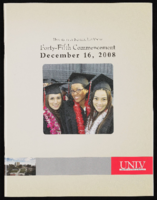
University of Nevada, Las Vegas (UNLV) 45th commencement program
Date
Archival Collection
Description
Commencement program from University of Nevada, Las Vegas Commencement Programs and Graduation Lists (UA-00115).
Text
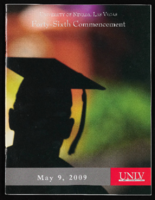
University of Nevada, Las Vegas (UNLV) 46th commencement program
Date
Archival Collection
Description
Commencement program from University of Nevada, Las Vegas Commencement Programs and Graduation Lists (UA-00115).
Text

